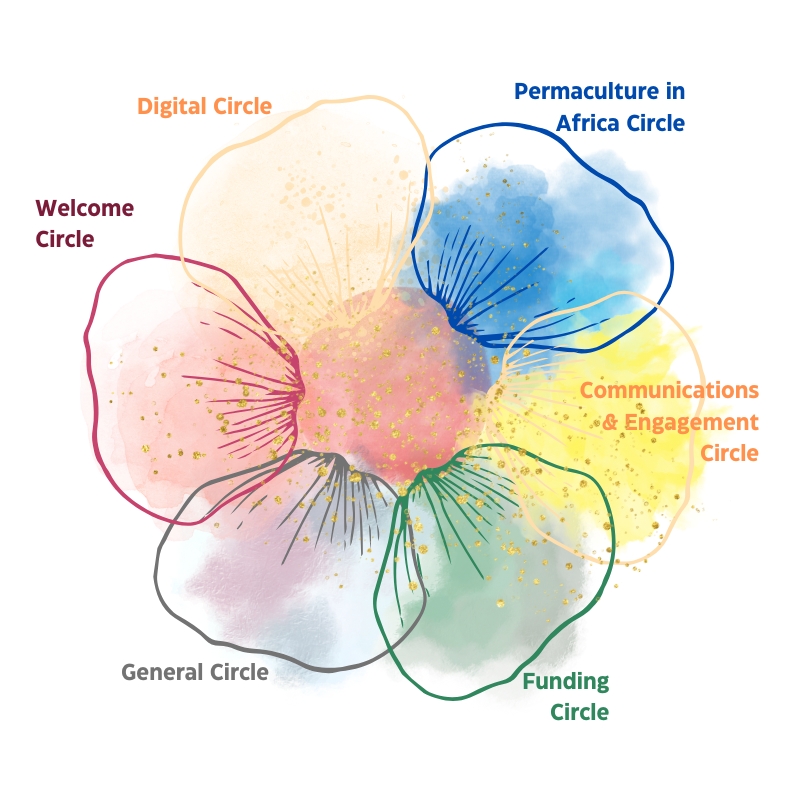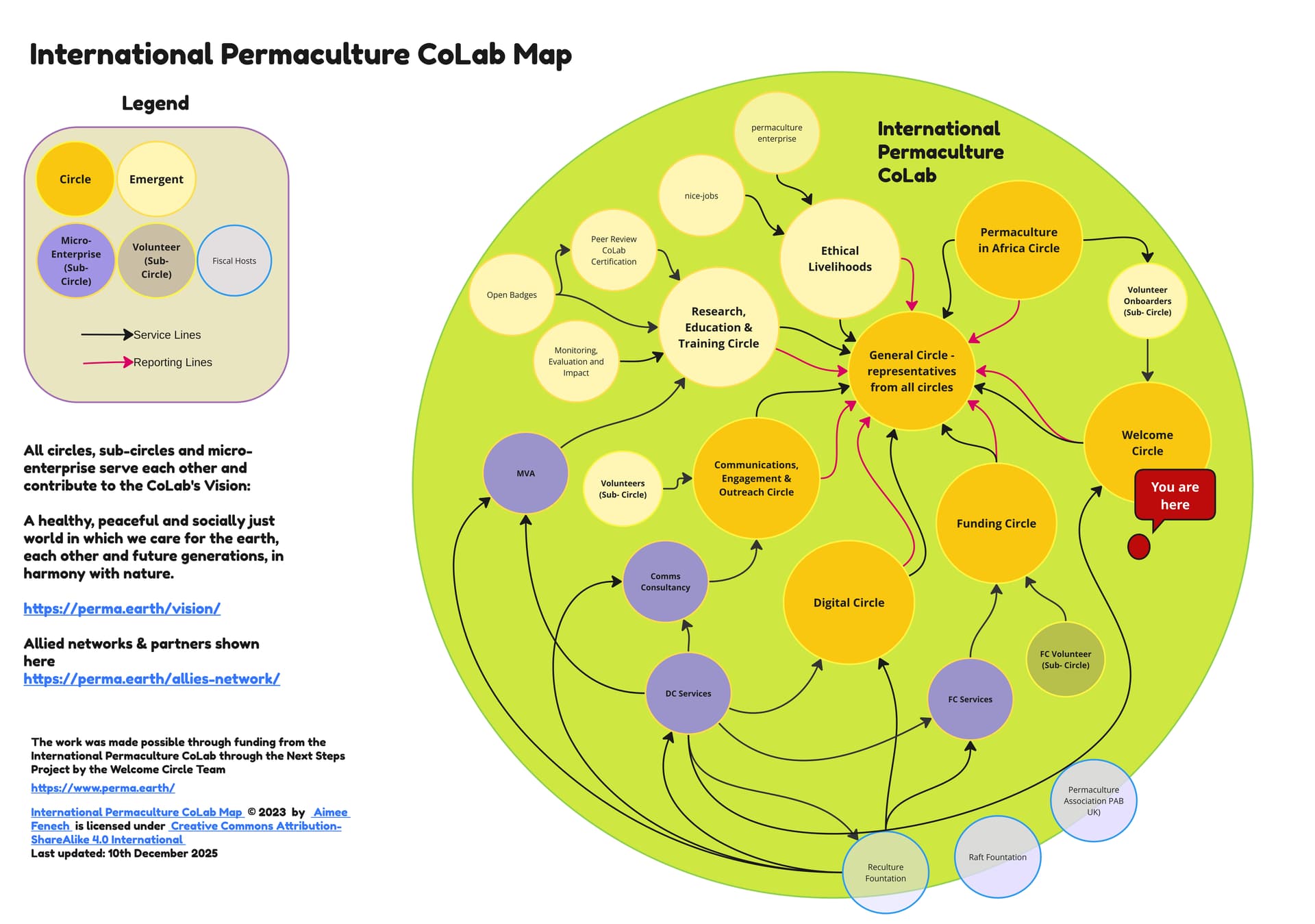About
The International Permaculture CoLab is a self-organised, on-line Collaborative Laboratory that helps improve coherence and collaboration in the international permaculture network (and beyond).
We are a network of individuals, organizations, and enterprises that aims to enhance the effectiveness of the global permaculture movement.
Appropriate Digital Technology is at the heart of the work we do to help support groups and projects to work together effectively.
Many experiments are underway that work towards this great goal and include:
- the creation and stewarding of online spaces for collaborative working,
- the weaving of synergistic networks within and beyond the permaculture movement,
- the application of permaculture ethics and design to social and digital systems,
- the support of emerging regenerative projects and networks in their ambitious work.
The CoLab is exploring new economic and governance models that can support the wider movement to become more effective, financial sustainable, able, self-sufficient and will also identify and amplify successful regenerative economic strategies already adopted within the network.

Governance
Its current structure and processes are influenced by The Constellation Framework and Sociocracy 3.0.
Click on the image to enlarge it.
The Constellation Framework mainly influences the overall structure of the CoLab. Sociocracy 3.0 leads us to make policy decisions by consent, using an inclusive and deliberative design process.
Domains of work in the CoLab are delegated to semi-autonomous ‘circles’ (groups, teams) connected by a circular feedback structure. Equivalence, transparency, and effectiveness are core values of the CoLab.
Sociocracy is a whole systems approach to governance using consent-based decision making which creates a safe environment for people to self-govern. Sociocracy uses a fractal organizational structure with a circular hierarchy.
The different Circles are working groups that have their own mission and aims and each Circle makes decisions about the responsibilities in their domain. CoLab tries to embody many of the Sociocratic principles.
Here’s a diagram which can give you more of a sense of CoLabs current (mid-2023) structure.
Financial Transparency
Circles use Open Collective in order to be transparent in the way funds are managed.
CoLab Circles
Welcome Circle
Available to facilitate better on-boarding experiences . Identify and encourage the development of generative relationships, building trust, and making information accessible to new members.
Facilitators : Aimee Fenech, Jyotsna Maan
Volunteer welcomers: Aimee Fenech, Jyotsna Maan, Abhishek
General Circle
To provide better coherence and communication across circles, a space to discuss CoLab-wide issues, and possibility for cross-circle learnings and collaboration.
Representatives of Colab: Jyo Maan – representative of MVA, Aimee Fenech – representative of Digital Circle and Funding Circle, Communications and Engagement Circle, Kate Swatridge and Ntsikelelo Colossa – representatives of Permaculture in Africa Circle, Alejandra Garcia – representative of Convergence Research
Digital Circle
Is a commons facilitated circle by committed
members who believe in supporting learning and innovation at the intersection between digital technology, permaculture design, and ecosocial justice.
Core Members: Aimee Fenech, Anton Oussik, Dominik Jais, Julius Pisch-Johansenn, Alejandra Garcia
Funding Circle
Identify and highlight value exchange and funding opportunities, build relationships with fundraisers and fiscal sponsors, create an opportunity to access resources and research for permaculture related projects and innovations in the field.
Core Members : Aimee Fenech, Hans Ryding, Paul Phillips
Volunteers: Charles Blass
Communications and Engagement Circle
Enhance communication within the CoLab and associated networks. Do engagement research into network weaving practices and processes. Offering cross-network training and knowledge sharing events. To do outreach work from the CoLab to the wider permaculture audience.
Core members: Charlie Wilson, Hans Ryding, Kate Swatridge, Aimee Fenech, Siobhan Vida Ashmole
Volunteers: Rogers Muthegheki
Permaculture in Africa Circle
Aiming to bridge the gap between grassroots projects in Africa and the CoLab (and beyond).
Core members: Aimee Fenech, Siobhan Vida Ashmole, Fikile Vilakazi-Alberts, Ntsikelelo Colossa, Alberts Vilakazi Leonora, Josie Redmonds
We are here today because of the unparalleled contribution of a wide range of active members since 2014.
We dedicate this space to honour them:
Andrew Langford, Beth Morgan, Brian von Herzen, Celia Ashman, Christina Mirasol Sayson, Gregorio Luiz Gomez, Jenny Birkby, John Schinnerer, Lauren Minis, Les Moore, Luiza Oliveira, Mario Yanez, Naomi Joy Smith, Steve Charter.
If your name is not here please let us know.
CoLab as …
An Enabling Space
- The CoLab is an environment in which work gets done.
- There are initiatives and projects in the permaculture movement that are waiting for the right conditions to emerge. The CoLab intents to create some of the conditions.
- Things are NOT forced into existence. Top-down, command and control, pouring money at a “problem”, etc. is not our style.
- The CoLab is designed to support projects that increase permaculture coherence and effectiveness.
A Network
- The work we do is based on people and their relationships, which lead to emerging initiatives.
- People and organisations come in and out of the network as it suits them and the rest of the network.
- Seeing the CoLab as a network emphasises that the whole system can take a variety of shapes and constantly evolves (rather than being a fairly static hierarchical system).

A Community
- Under the banner of the CoLab people come together that share an identity. They share, for example, the CoLab’s vision, mission, and values.
- Community contributors share and co-create the enabling space that is the CoLab.
An Enterprise
- The CoLab is offering services (and maybe even products).
- The CoLab intends to secure its own resources (including financial compensation for some of the service it might offer) to be financially sustainable.
- The CoLab attempts to raise resources to the end of supporting projects it identifies as priorities and to facilitate individuals in the network to make a living.
An Experiment
- The way the CoLab works is experimental. By risking to fail we speed up the learning.
- The people in the CoLab are aware that not everything is always going to work on the first attempt (or at all). The key is to keep showing up.
- The people in the CoLab are happy to give it a go; ‘good enough for now, safe enough to try’ is often all that is needed to move ahead. Iteration and ongoing improvement is a daily practice.
